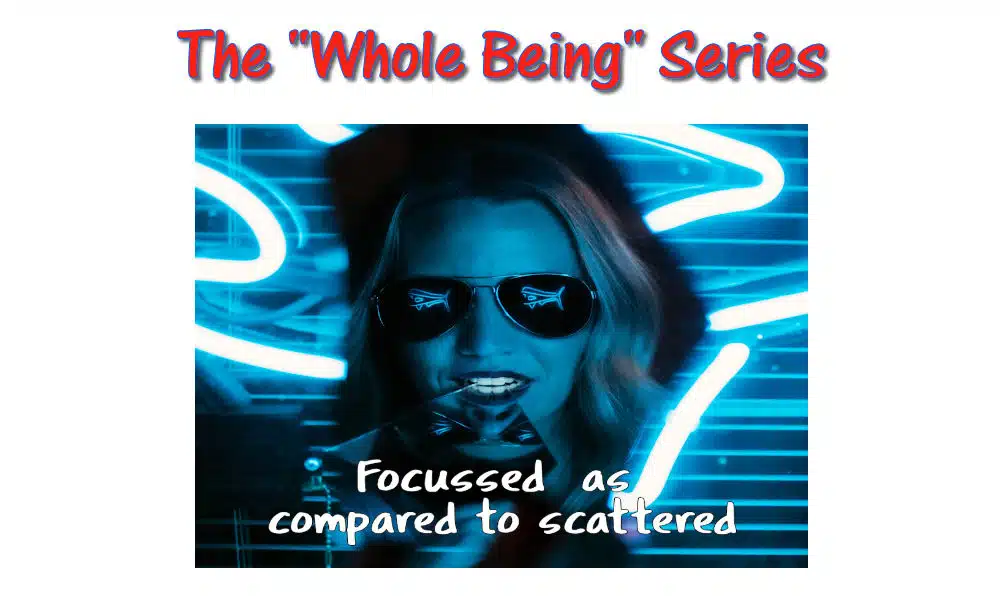- Whole Being-Focussed as compared to scattered
- Whole Being — Responsive as Compared to Reactive
Focussed as compared to scattered — You ever watch people walking along while texting? That’s what scattered looks like. It’s a miracle they survive. Being focussed takes discipline.

My first and most popular book,
This Endless Moment.
Learn to live a full and satisfying life.
Here’s a story from a couple of decades ago:
I’d been working with a new client; the guy who has learned that his wife is having an affair. She was being pretty blatant about it — she’d even taken off to Europe with him, and had introduced “mister wonderful” to her two grown children.
My client was all over the map with it — and I understand that — after all, he’d never experienced this before. He was a scientist, and he was used to precision, unemotional behaviour and “things making sense.”
His approach has been quite scattered. He’d made demands, and then retracted them. He’d yelled and screamed… then tried tact and diplomacy. He’d worried about losing the house, losing the kids. He’d talked to a slew of his friends, and of course kept getting conflicting advice.
I don’t think he quite “got” me — because no matter how complex he made the situation, I kept suggesting that he say to her:
“I’m not happy with the present situation. I need to know, by (3 weeks later) whether you are willing to work on saving the marriage.”
This approach cuts to the heart of what is actually going on. It pulls all of the scattered pieces together.
He, however, wasn’t buying it.
He was lost in his head, concocting all kinds of scenarios, involving the kids, the community. He spent his days scaring and confusing himself, switching between anger and acting kind and sweet. He hoped that “everything will just blow over.”
The problem with this approach is, it’s a waste of time.
His approach might have had a small chance of working, but only if what she wanted was for the marriage to improve.
What he needed, I would argue, was focussed attention on one thing:
“What is my wife’s intent?”
We might define:
- Scattered: being all over the place, whether physically, mentally, or emotionally.
- Focussed: being of one “mind.” One self. It’s “being integrated.”
There is nothing “wrong” with being scattered. We live in a chaotic, random universe, and sometimes, perhaps often, we need to let our hair down and let go of thinking we can control any of it.
I used to teach businesses and individuals lateral thinking; I don’t know a lot of people who are good at that. Basically, a free flow of ideas end up getting systematized.
The lateral thinking process might appear chaotic or scattered, but it isn’t. While there is an incredibly free flow of ideas and a lot of looking at things from several angles, what’s really going on is what might be called focussed chaos.
It’s not “out of control” — there is structure and meaning in the process. It’s a lot like modern art.
Problems occur when there is undisciplined anything. So we propose structured chaos. In other words, even chaos is beneficial when one remains focussed.
True chaos, on the other hand, often leads to hospitalization.
There is an implicit order and direction (a focus) beneath things that actually accomplish something. Being scattered means yielding to whim.
Examples of being scattered:
- Running blindly from one thing to another thing.
- Not attending to the present moment because of the appeal of your fantasies regarding the past, the future, or “what’s wrong.”
- Not dealing elegantly and directly with relationships because what’s going on in your head doesn’t match what’s going on in the relationship, and you opt for your head, thereby losing the relationship.
My preference (neither right nor wrong — just a preference) is for focus. I prefer great flexibility in my thinking and acting, without chaotic or scattered thought or action.
My reason is simple. I choose to be guided by certain flexible principles, not just do whatever crosses my mind.
While I agree with the writers of “Language, Structure and Change”– that “Life is a purposeless drift,” I also agree with David Raithby —
“We may not know where we are going, but we can choose to go in a group.”
Or Ben Wong —
“The facts of your life remain. What you do with those facts is up to you.”
My 42 year focus on growing and deepening my relationship with Darbella, for example, precludes doing things that will complicate matters.
There is great flexibility in our relationship, but the bottom line is that we are committed to a daily walk together. So, I’m not going to pick a fight with her because I’m having a bad day or because I need to be right.
My focus on deepening the relationship precludes my being a jerk and demanding my own way.
Focussed attention also applies in the “real world” of problem solving.
Dar and I once spent a day “surviving.” We’d driven north of Sudbury, and stayed with a friend. The guy was a canoeist, and we had our kayaks along, so we’d asked him to set up a paddle for us.
He picked John’s Creek.
Following a hydro corridor, he drove us into the bush in a Land Rover. We reached what I would call a river, not a creek. But I don’t live in the North. The sucker was 60 feet wide and ripping along.
He says,
“Hmm. I paddled this creek a month ago. Took me a couple of hours to get to the lake, and then a couple of hours across the lake. But a tornado went through here a couple of days ago. Looks like there’s more water in the system. Watch out for dead-fall from the tornado.”
Undaunted, we pressed on.
Our kayaks are river kayaks. We can’t pack much. We had a first aid kit, basic survival gear, and two meals. And a tarp.

We paddled along, taking in the wilderness. We looked at birds and animals scurrying in the woods. We hit the first dead-fall 30 minutes in.
Last thing you want to do is get pinned to a dead-fall in a kayak in a running river. That will kill you, for sure.
Took us 20 minutes to carefully navigate around it; we managed to do it without leaving the boats.
The next dead-fall was different. A huge tree was down across the whole “creek.” It was sticking out of the river a couple of feet for the entire width of the “creek.” The banks on both sides were not climbable, which meant we had to stay in the kayaks and get past the dead-fall.
I headed to a bank and had a look around. I discovered three things.
1) There was a waterfall 100 feet past the dead-fall.
2) There was a spot after the dead-fall and above the waterfall to pull out the kayaks.
3) There was a huge, bloated, dead moose caught in the dead-fall.
We decided we’d have to crawl out of the kayaks, climb up onto the downed tree trunk, pick up the boats, swing them over the tree and get back in, all without touching the moose.
We did a pile of thinking and talking, then followed through with our plan. (Dead moose smells nasty, in case anyone asks you.)
We slithered out of our kayaks, picked them up, lifted them over the tree, and slithered back in.
We then paddled to the spot where we could get up the bank, got out of our boats, and then portaged the kayaks past what turned out to be a quite large waterfall, perhaps 50 feet high.
We got past the waterfall, but there was no path to take the boats back down. Just a steep embankment.
(By the bye, I hope you’re getting the point. What should have been an easy paddle turned into a dangerous obstacle course. While we had a prior plan, actual conditions on the “creek” meant that we had to continually go into lateral thinking to get home. Scattered panic wouldn’t do. Focussed, lateral thinking was a must.)
We sat there a few minutes, weighing our options, which ere limited.
Our only “out” was the “creek”–there wa$no going back.
So, one after another, we climbed into our kayaks, wiggled our butts and got them to tip over the embankment. We slid down, through trees and brush, and crashed back into the creek.
Neither of us wanted to capsize and swim in water downstream of the dead moose, so we managed to keep the boats upright.
I could go on and on, but we stopped for lunch, several dead-falls and another waterfall. No more moose, though. It took us 8 hours just to paddle the “creek.”
Our survival depended, as it does in “real life,” on focus, determination and free thinking.
We paddled another 3 hours across the lake, past the hydro dam, and got to a road. Our friends’ house was 3 kilometers down the road, which meant we had to carry our gear and the kayaks, after paddling 11 hours.
We ended up carrying one together for 100 feet, going back and getting the other, carrying it past the first by 100 feet, going back… you get it.
15 hours after we started, we made it back. Obviously.
The wilderness has taught us many lessons, chief of which is the need for focus and commitment.
This week, look at your focus. How often do you lose your focus regarding your relationships, job, path, because your attention wanders and you get “scattered?”
How often do you act rigidly, and miss the way out? How often are you stuck in being right, as opposed to having a flexible focus?
At the end of the day, life’s a purposeless drift. Where you end up, and in what condition, is entirely up to you.
